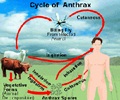According to a study a minor reduction in levels of a gene called CD45 may provide protection against the virus that causes Ebola hemorrhagic fever and the bacterium that causes anthrax.
Published in the online issue of Cell Host and Microbe, the study on mice was led by scientists at the U.S. Army Medical Research Institute of Infectious Diseases (USAMRIID).The researchers say that their findings suggest a common host restriction factor as well as a promising approach to drug development for treating two completely different infections.
During the study, the researchers observed that the mice that expressed reduced levels of CD45-between 11 and 77 percent-were protected against Ebola virus.
Besides an overall survival rate of 90 to 100 percent, the mice were also found to have reduced levels of virus load in the major organs.
The researchers said that the experimental mice had completely cleared the virus 10 days after challenge.
On the other hand, they added, the mice that had naturally occurring levels of CD45-or none at all- failed to clear the virus, and succumbed to infection within 7 to 8 days following challenge.
Advertisement
The researchers created various "knockdown" mice, which expressed reduced levels of CD45, to determine how those changes may alter the body's immune response to microbial pathogens such as Ebola virus.
Advertisement
Based on the study's findings, the authors came to the conclusion that host susceptibility to Ebola virus is dependent on the delicate balance of the body's natural immune system, which can be determined by the levels of a single regulator gene.
The study built upon a related study, published in the Journal of Biological Chemistry in May this year, which showed that CD45 also plays a role in protection from Bacillus anthracis, the causative agent of anthrax.
The next step for the researchers is to look at the mechanism of action to better understand how reduced expression of this gene regulates the pathogenesis of both diseases, as that information may one day lead to the identification and discovery of additional promising compounds for treating Ebola and anthrax infections.
Source-ANI
ARU













